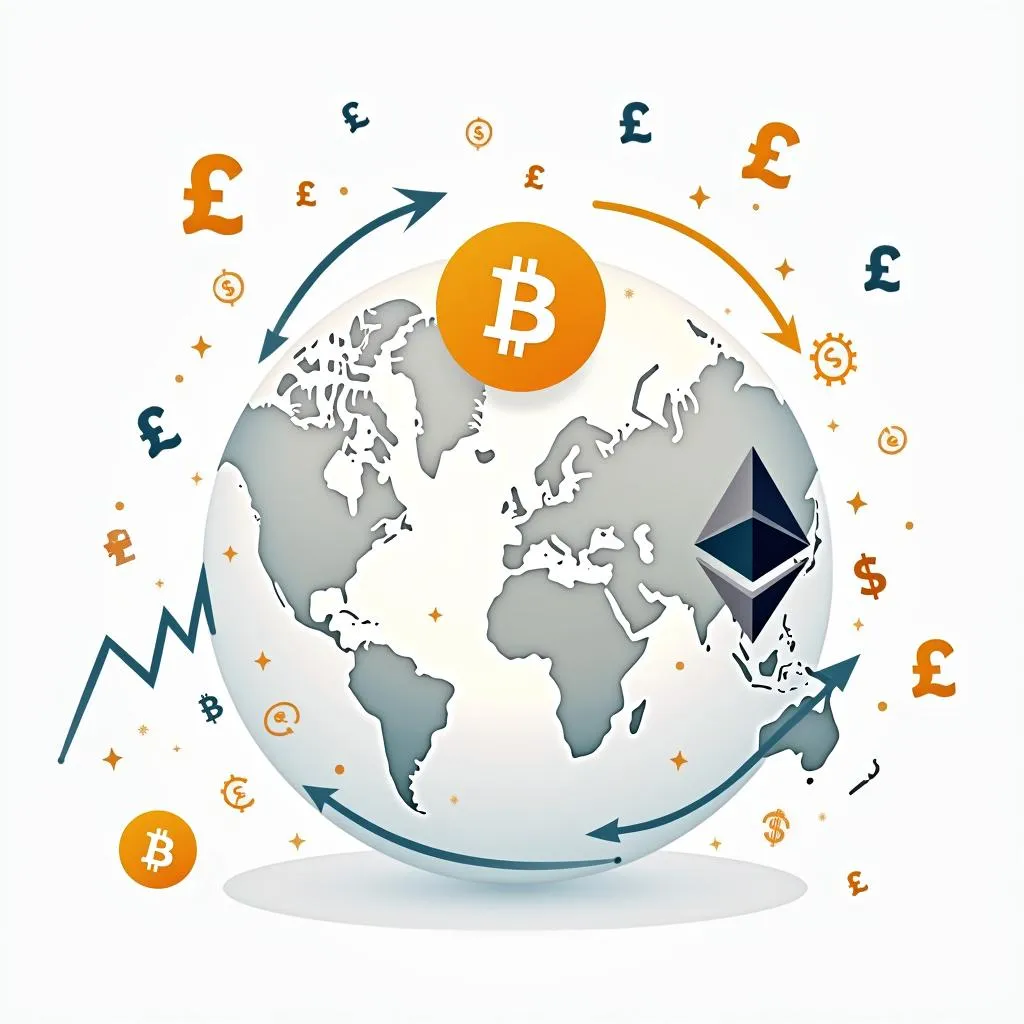Digital currencies have become a hot topic in recent years, and their impact on the global economy is undeniable. As a result, this subject has been increasingly featured in IELTS Writing Task 2 essays. Based on an analysis of past IELTS exams and current trends, we can expect questions related to digital currencies to appear more frequently in future tests. Let’s explore a relevant question that has appeared in recent IELTS exams and provide sample essays for different band scores.
Nội dung bài viết
Some people think that digital currencies like Bitcoin will eventually replace traditional currencies and transform the global economy. To what extent do you agree or disagree with this view?
Analyzing the Question
This question asks for your opinion on the potential of digital currencies to replace traditional currencies and their impact on the global economy. To answer effectively, you should:
- Clearly state your position (agree, disagree, or partially agree)
- Provide reasons and examples to support your view
- Discuss both the potential benefits and drawbacks of digital currencies
- Consider the implications for the global economy
Now, let’s look at sample essays for different band scores.
Band 8 Sample Essay
Digital currencies, particularly cryptocurrencies like Bitcoin, have garnered significant attention in recent years due to their potential to revolutionize financial transactions. While I agree that these digital assets will play an increasingly important role in the global economy, I do not believe they will completely replace traditional currencies in the foreseeable future.
One of the main advantages of digital currencies is their ability to facilitate fast and secure cross-border transactions without the need for intermediaries. This can significantly reduce transaction costs and processing times, making international trade more efficient. For instance, a company in India could instantly pay its suppliers in China using Bitcoin, bypassing the traditional banking system and avoiding currency conversion fees. Furthermore, blockchain technology, which underpins most cryptocurrencies, offers enhanced transparency and security, potentially reducing fraud and increasing trust in financial systems.
However, several factors hinder the widespread adoption of digital currencies as a complete replacement for traditional money. Firstly, the volatility of cryptocurrencies makes them unreliable as a store of value or medium of exchange. The dramatic price fluctuations of Bitcoin, for example, make it challenging for businesses and individuals to use it for everyday transactions or long-term financial planning. Secondly, regulatory concerns and the lack of centralized control pose significant challenges. Governments and central banks are unlikely to relinquish their monetary policy powers, which are crucial for managing national economies.
Moreover, the technical complexity and limited accessibility of digital currencies present barriers to universal adoption, particularly in developing countries with limited technological infrastructure. Traditional currencies, backed by governments and central banks, still offer stability and widespread acceptance that digital alternatives struggle to match.
In conclusion, while digital currencies will undoubtedly transform aspects of the global economy, particularly in international finance and trade, they are more likely to coexist with traditional currencies rather than replace them entirely. The future financial landscape will likely be a hybrid system, incorporating the strengths of both digital and traditional currencies to create a more efficient and inclusive global economy.
(Word count: 309)
 Digital currencies transforming the global economy
Digital currencies transforming the global economy
Explanation of Band 8 Score
This essay demonstrates the qualities of a Band 8 response:
-
Task Response: The essay fully addresses all parts of the task, presenting a clear position with a nuanced view of partial agreement.
-
Coherence and Cohesion: Ideas are logically organized with clear progression. Paragraphs are well-linked, and cohesive devices are used effectively (e.g., “However,” “Moreover,” “In conclusion”).
-
Lexical Resource: A wide range of vocabulary is used accurately and appropriately (e.g., “revolutionize,” “intermediaries,” “volatility,” “relinquish”).
-
Grammatical Range and Accuracy: Complex sentence structures are used accurately, with only rare minor errors. Various grammatical structures are employed effectively.
-
Development and Support: Each main idea is well-developed with relevant examples and explanations, demonstrating a sophisticated understanding of the topic.
Band 7 Sample Essay
In recent years, digital currencies such as Bitcoin have gained significant popularity, leading some to believe that they will eventually replace traditional currencies and transform the global economy. While I agree that digital currencies will have a substantial impact, I do not think they will completely replace conventional money in the near future.
One of the main advantages of digital currencies is their ability to facilitate quick and low-cost international transactions. Unlike traditional bank transfers, which can take days and incur high fees, cryptocurrencies allow for almost instant transfers across borders with minimal costs. This could greatly benefit businesses engaged in international trade and individuals sending remittances to their home countries. Additionally, digital currencies offer increased financial inclusion for those without access to traditional banking services, particularly in developing nations.
However, there are several challenges that prevent digital currencies from fully replacing traditional money. Firstly, the volatile nature of many cryptocurrencies makes them unreliable for everyday transactions and savings. For example, the value of Bitcoin has experienced dramatic fluctuations, making it difficult for people to use it as a stable medium of exchange. Secondly, governments and central banks are likely to resist the widespread adoption of digital currencies as it would limit their control over monetary policy, which is crucial for managing national economies.
Furthermore, the technical complexity of using digital currencies poses a significant barrier for many people, especially older generations and those in less technologically advanced regions. Traditional currencies, on the other hand, are simple to use and widely accepted.
In conclusion, while digital currencies will undoubtedly play an increasingly important role in the global economy, particularly in international finance and remittances, they are unlikely to completely replace traditional currencies in the foreseeable future. Instead, we may see a hybrid system where digital and conventional currencies coexist, each serving different purposes in the global financial landscape.
(Word count: 298)
Explanation of Band 7 Score
This essay demonstrates the qualities of a Band 7 response:
-
Task Response: The essay addresses all parts of the task and presents a clear position, though the ideas are less fully developed compared to the Band 8 essay.
-
Coherence and Cohesion: The essay is well-organized with clear progression of ideas. Paragraphs are generally well-linked, though cohesive devices are less sophisticated than in the Band 8 essay.
-
Lexical Resource: A sufficient range of vocabulary is used appropriately, with some less common items (e.g., “remittances,” “financial inclusion”). However, the range is not as wide as in the Band 8 essay.
-
Grammatical Range and Accuracy: A mix of simple and complex sentence structures is used, with good control and only occasional errors.
-
Development and Support: Main ideas are supported with relevant examples, though not as fully elaborated as in the Band 8 essay.
 Digital and traditional currencies coexisting
Digital and traditional currencies coexisting
Band 6 Sample Essay
Nowadays, digital currencies like Bitcoin are becoming more popular, and some people think they will replace normal money and change the world economy. I partly agree with this idea because digital currencies have some advantages, but there are also problems that make it difficult for them to completely replace traditional money.
One good thing about digital currencies is that they are fast and cheap to use for sending money to other countries. For example, if someone wants to send money to their family in another country, they can use Bitcoin and it will be much quicker and cheaper than using a bank. Also, digital currencies can help people who don’t have bank accounts to use money online, which is good for poor people in some countries.
However, there are some big problems with digital currencies that make it hard for them to replace normal money. First, the value of digital currencies changes a lot, which means people can’t trust them for everyday use. If you buy something with Bitcoin today, it might be worth a different amount tomorrow. This is not good for businesses or people who want to save money. Also, governments don’t like digital currencies because they can’t control them like they can with normal money.
Another problem is that many people don’t know how to use digital currencies. It’s complicated and you need a computer or smartphone, which not everyone has. Old people and people in poor countries might find it very difficult to use digital money.
In conclusion, I think digital currencies will become more important in the future, but they won’t completely replace traditional money. Maybe we will use both types of money for different things in the future.
(Word count: 276)
Explanation of Band 6 Score
This essay demonstrates the qualities of a Band 6 response:
-
Task Response: The essay addresses the main parts of the task, but the development of ideas is less thorough compared to higher band scores.
-
Coherence and Cohesion: There is a clear overall progression, but paragraphing and cohesive devices are less skillfully managed than in Band 7 and 8 essays.
-
Lexical Resource: The vocabulary used is adequate for the task, but lacks the range and precision of higher band scores. There is some repetition (e.g., “normal money”).
-
Grammatical Range and Accuracy: A mix of simple and complex structures is attempted, but there are more noticeable errors. The range of structures is more limited than in higher band essays.
-
Development and Support: Some relevant examples are provided, but they are not as well-developed or specific as in higher band essays.
Key Vocabulary to Remember
- Cryptocurrency (noun) – /ˈkrɪptəʊˌkʌrənsi/ – a digital currency that uses encryption techniques to regulate the generation of units and verify fund transfers
- Blockchain (noun) – /ˈblɒktʃeɪn/ – a digital ledger in which transactions are recorded chronologically and publicly
- Volatility (noun) – /ˌvɒləˈtɪləti/ – liability to change rapidly and unpredictably, especially for the worse
- Remittance (noun) – /rɪˈmɪtns/ – a sum of money sent in payment or as a gift
- Financial inclusion (noun phrase) – /faɪˈnænʃl ɪnˈkluːʒn/ – the availability and equality of opportunities to access financial services
- Monetary policy (noun phrase) – /ˈmʌnɪtri ˈpɒləsi/ – the actions of a central bank to influence the quantity of money and credit in an economy
- Intermediary (noun) – /ˌɪntəˈmiːdiəri/ – a person or organization that acts as a link between people or organizations
- Decentralized (adjective) – /diːˈsentrəlaɪzd/ – the transfer of control from one central authority to several local authorities
The influence of global tourism on preserving cultural heritage is another important topic that IELTS candidates should be prepared to discuss. Like the impact of digital currencies, tourism can have both positive and negative effects on local cultures and economies.
Conclusion
The topic of digital currencies and their impact on the global economy is likely to remain relevant for future IELTS exams. To prepare effectively, practice writing essays on related subjects such as:
- The advantages and disadvantages of a cashless society
- The role of technology in modern banking
- The impact of globalization on national economies
- The future of international trade and finance
Remember to structure your essay clearly, use a range of vocabulary and grammatical structures, and provide specific examples to support your arguments. By studying the sample essays and explanations provided, you can improve your writing skills and aim for a higher band score in your IELTS Writing Task 2.
How e-commerce is influencing traditional shopping behavior is another topic that shares similarities with the digital currency discussion, as both involve the transformation of traditional practices through technology.
We encourage you to practice writing an essay on the given topic and share it in the comments section below. This active practice will help you improve your writing skills and prepare you for success in the IELTS exam.


